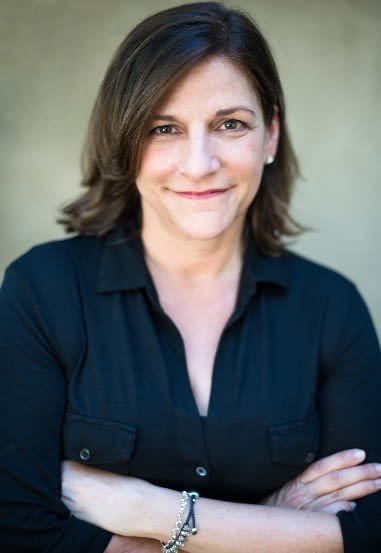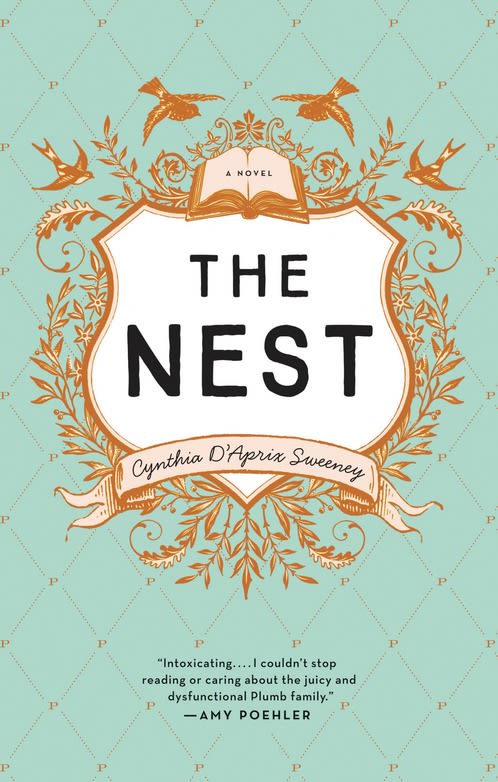A 50-Something, First-Time Novelist Brings Her Million-Dollar Book to Portland

Cynthia D'Aprix Sweeney
Image: ecco
Cynthia D’Aprix Sweeney was a freelance marketing and communications consultant approaching her 50s when her husband’s job—he’s head writer for Conan—took her family from New York to Los Angeles, and she took a risky career U-turn. Now, at 55, she’s on a book tour with her first novel, The Nest, a tale of four New York siblings hung up on a shared inheritance, which earned her a seven-figure deal from HarperCollins. Oh, and Amy Poehler loves it. We caught up with the funny, personable writer by phone ahead of her Powell’s reading on Wednesday, March 30 and found out—among other things—why she owes Elizabeth Gilbert a drink.
The Nest represents a major career change for you, from marketing to fiction writing. How did it come about?
From the time I was a kid, I loved fiction. I read fiction constantly. I graduated from college and got a job in marketing, and I thought about writing fiction in my late twenties and briefly dabbled in it, but I had no plan and no way to go about it, and did it really halfheartedly. I got discouraged really fast. I can say now in retrospect that I attached a fair amount of shame to that experience in a way that made me not want to revisit for a long time. And life happened. I got married, and I had kids and being a freelance marketing, branding, and communications person was great, because the schedule was really flexible and I could work around being a parent.
So what changed?
As my kids got older, and I didn’t really need the flexibility that much, the fact that the work wasn’t particularly satisfying started to bother me, and I started to feel like, “OK, now I have to figure out how to do something that I can be passionate about.” I got out to LA and I really didn’t have anything to do, so I started taking fiction writing classes, and I gave myself one year to decide whether or not I was going to really, really commit to fiction writing. By the end of that year, I had decided to apply for MFA programs.
You ended up doing the MFA at Bennington. Was that valuable?
I think whatever you get out of an MFA you can get on your own, I just think it would take longer. And I didn’t feel like I had time on my side, to say the least. I didn’t know how to tap into the literary community in Los Angeles, and I really wanted deadlines and I really wanted structure, and I really wanted to test myself in a very intense way. I don’t think you need an MFA program for any of those things, but you have to be a really disciplined person—well, you have to be more disciplined than I am—to do it entirely on your own.
That’s where The Nest began?
I started The Nest at the very end of my program there—in my thesis term. The beginning of that book was my thesis.
Can you pinpoint where the idea for The Nest came from? What was its genesis?
I can pinpoint it exactly! I was walking to meet my family for brunch in New York City, and it felt to me that there was a restaurant literally on every street corner with people sitting in the windows having drinks. I just had this image of family members who are about to get together, but want to have a drink before they see one another.
In that flash, it was literally four siblings having drinks on four separate street corners—and then it was time for brunch and they all left and saw each other and knew what they had each been doing. That was my cinematic moment, and the minute I thought of it, I thought, “That’s a great way to start a story.” So I just started thinking, who are these people? What is happening when they meet that’s difficult? Why do they need a drink before they see each other? Why don’t they want to have a drink with one another?

Image: ecco
Much of the book is an examination of that sibling relationship, and the way we act around family that differs so much from how we navigate the rest of the world.
I’m really fascinated with siblings. As you age, and as your parents age, those relationships can be really, really fraught.
The book has some characters recalling their youth, which gives some context to their current situation while offering them—or one character in particular, the problematic oldest son Leo—some more sympathetic moments.
I think it’s easier when you’re younger. I have three siblings. I am the oldest, and we are all dramatically different, and I found everyone more amusing when I was younger. And I just think that when you’re younger, especially when you’re all stuck living in the same house, you tolerate each other a little more, and you find that space in your heart to be a little more forgiving when you see people suffering in the exact same way you’re suffering.
Was being married to a writer—your husband Mike Sweeney is head writer for Conan—helpful when it came to completing the novel?
Our jobs are so different and what we write and how we write is so completely different. I show him stuff and he’s always very honest with me, but he reads my stuff as a reader, and I read his stuff as a television viewer, not as a writer. That’s the valuable perspective we bring to each other’s work, but that would be true in any marriage. He’s been really helpful with book promoting stuff, because he’s dealt with the press, and with interviews, and having to talk to people on TV or on radio.
He’s a fan of what I do, and I’m a fan of what he does, so we’re probably not each other’s best readers. But we’re good cheerleaders!
You finished the book just before it was sent out on submission, and then somehow landed a seven-figure deal, selling to HarperCollins on a preempt (without even going to auction). What was that like?
It happened very fast. The first offer came in on Tuesday, and by Thursday we had accepted their preempt. It was supposed to go to auction the following Monday, but it never did.
Were you gobsmacked by the aggressive interest in the book?
I would say gobsmacked is the perfect word. I was walking around in a daze for two days, and yeah, I’m not even sure I’ve still quite processed it. There was a lot of whiskey drinking going on that week.
And you somehow snagged a blurb from Amy Poehler, who called it “intoxicating”!
She’s an old friend of mine. We actually met in a book group many, many years ago! She’s an avid reader—of fiction, especially—and she was very excited when I went back to school and was going to write a book. She’s a really amazing human being for a million reasons, but she loves to use her powers for good and promote her friends whenever she can. She said when can I read the book, and can I write a blurb?
So wait, there’s a blurb from Elizabeth Gilbert there too, who calls it “masterfully constructed.” Is she another friend?
I have never met Elizabeth Gilbert. But I really like her! And I definitely owe her a drink.
Cynthia D'Aprix Sweeney is in conversation with Peter Ames Carlin at Powell's City of Books on Wednesday, March 30.
